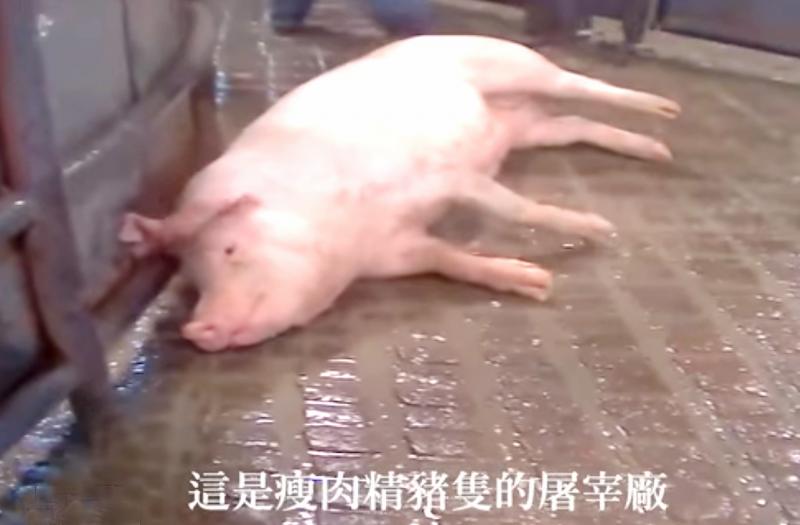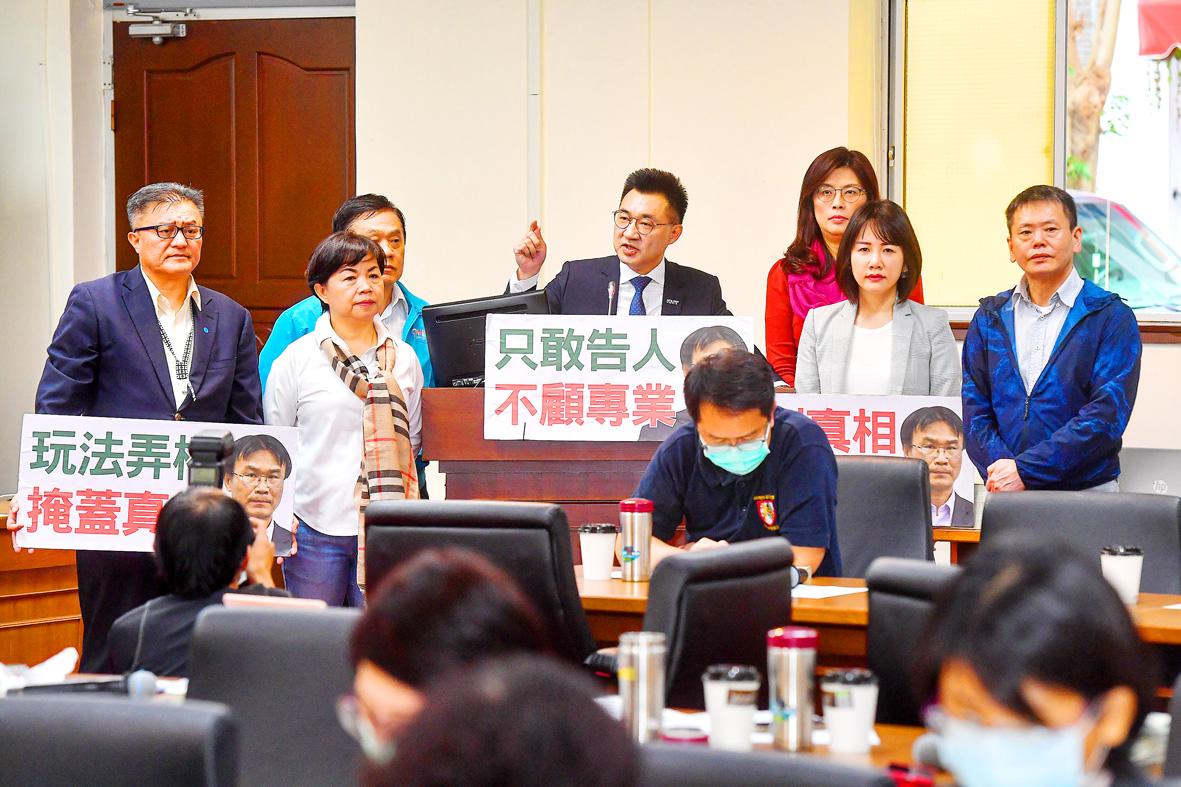The Council of Agriculture (COA) yesterday urged the Chinese Nationalist Party (KMT) to remove a video it posted on Facebook on Tuesday, saying that it might be spreading false information by claiming that pigs given ractopamine experience physical and emotional pain.
The KMT is using the video, which shows pigs shivering and in apparent pain, as part of its attacks on the government’s decision to lift an import ban on pork containing the leanness-enhancing drug, COA Minister Chen Chi-chung (陳吉仲) said ahead of a budget review at the Legislative Yuan in Taipei.
The video was made by the US-based Animal Outlook group and released by the organization to protest inhumane killings of hogs at slaughterhouses, Chen said, adding that ractopamine was not mentioned in the original video.

Photo: Screen grab from Facebook
The KMT added Chinese narration that is inconsistent with the images, making the video “100 percent falsified and 100 percent inaccurate,” he said.
The KMT’s video said that “it is a slaughterhouse of pigs fed with the leanness-enhancing drug,” “ractopamine incites mood swings in pigs” and “pigs fed with the additive would get sick, let alone humans.”
The video allegedly constitutes spreading misinformation and generating a sense of public fear as the KMT attempts to mislead people by linking the drug to hog abuse, Chen said.

Photo: CNA
If the KMT does not remove the video, the council would file a lawsuit under the Social Order Maintenance Act (社會秩序維護法), Chen said, urging people not to repost or share it.
KMT Chairman Johnny Chiang (江啟臣) said that the party would not remove the video, as the information in it has been verified.
Not only has the government refused to address the health concerns surrounding pork containing traces of ractopamine, it is also seeking to deny freedom of speech, Chiang said.
A government that damages people’s health is in no position to punish a group defending health for others, he said.

Conflict with Taiwan could leave China with “massive economic disruption, catastrophic military losses, significant social unrest, and devastating sanctions,” a US think tank said in a report released on Monday. The German Marshall Fund released a report titled If China Attacks Taiwan: The Consequences for China of “Minor Conflict” and “Major War” Scenarios. The report details the “massive” economic, military, social and international costs to China in the event of a minor conflict or major war with Taiwan, estimating that the Chinese People’s Liberation Army (PLA) could sustain losses of more than half of its active-duty ground forces, including 100,000 troops. Understanding Chinese

The Ministry of Foreign Affairs (MOFA) yesterday said it is closely monitoring developments in Venezuela, and would continue to cooperate with democratic allies and work together for regional and global security, stability, and prosperity. The remarks came after the US on Saturday launched a series of airstrikes in Venezuela and kidnapped Venezuelan President Nicolas Maduro, who was later flown to New York along with his wife. The pair face US charges related to drug trafficking and alleged cooperation with gangs designated as terrorist organizations. Maduro has denied the allegations. The ministry said that it is closely monitoring the political and economic situation

‘SLICING METHOD’: In the event of a blockade, the China Coast Guard would intercept Taiwanese ships while its navy would seek to deter foreign intervention China’s military drills around Taiwan this week signaled potential strategies to cut the nation off from energy supplies and foreign military assistance, a US think tank report said. The Chinese People’s Liberation Army (PLA) conducted what it called “Justice Mission 2025” exercises from Monday to Tuesday in five maritime zones and airspace around Taiwan, calling them a warning to “Taiwanese independence” forces. In a report released on Wednesday, the Institute for the Study of War said the exercises effectively simulated blocking shipping routes to major port cities, including Kaohsiung, Keelung and Hualien. Taiwan would be highly vulnerable under such a blockade, because it

UNRELENTING: China attempted cyberattacks on Taiwan’s critical infrastructure 2.63 million times per day last year, up from 1.23 million in 2023, the NSB said China’s cyberarmy has long engaged in cyberattacks against Taiwan’s critical infrastructure, employing diverse and evolving tactics, the National Security Bureau (NSB) said yesterday, adding that cyberattacks on critical energy infrastructure last year increased 10-fold compared with the previous year. The NSB yesterday released a report titled Analysis on China’s Cyber Threats to Taiwan’s Critical Infrastructure in 2025, outlining the number of cyberattacks, major tactics and hacker groups. Taiwan’s national intelligence community identified a large number of cybersecurity incidents last year, the bureau said in a statement. China’s cyberarmy last year launched an average of 2.63 million intrusion attempts per day targeting Taiwan’s critical